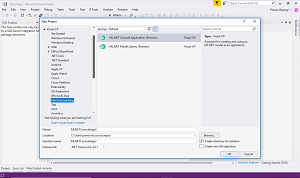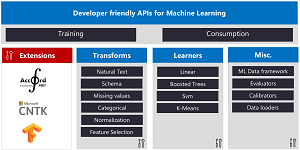News
ML.NET Update for Machine Learning Comes with New Visual Studio Templates
Microsoft today released an update to its ML.NET framework that includes new Visual Studio templates to help developers code their machine learning console applications and model libraries.
The open source and cross-platform (running on Windows, Linux and macOS) framework helps developers use existing tools and skills to create custom machine learning models and leverage custom AI in their applications, Microsoft said.
 [Click on image for larger view.] Machine Learning Templates in Visual Studio (source: Microsoft).
[Click on image for larger view.] Machine Learning Templates in Visual Studio (source: Microsoft).
Along with a bevy of new functionality and fixes, ML.NET 0.9 includes a preview of the new Visual Studio ML.NET project templates.
"We are pleased to announce a preview of Visual Studio project templates for ML.NET," Microsoft's Cesar de la Torre said in a blog post today (Jan. 10). "These templates make it very easy to get started with machine learning. You can download these templates from Visual Studio gallery here."
 [Click on image for larger view.] ML.NET APIs at the Time of the Original Announcement (source: Microsoft).
[Click on image for larger view.] ML.NET APIs at the Time of the Original Announcement (source: Microsoft).
De la Torre said the templates cover these scenarios:
- ML.NET Console Application -- A sample app demonstrating how to use a machine learning model in an application.
- ML.NET Model Library -- Creates a new machine learning model library that can be consumed from within an application.
A bunch of other new features are detailed in the post, focusing on API enhancements, model explainability and feature contribution, GPU support when scoring ONNX models and clean-up of framework internals.
Going forward, de la Torre said: "While on the past 9 months we have been adding new features and improving ML.NET, in the forthcoming 0.10, 0.11 and upcoming releases before we reach v1.0, we will focus on the overall stability of the package, continue to refine the API, increase test coverage and improve documentation and samples." ML.NET has been steadily climbing toward v1.0 status since being introduced at the Microsoft Build conference in May.
Source code for ML.NET can be found on GitHub here.
About the Author
David Ramel is an editor and writer at Converge 360.